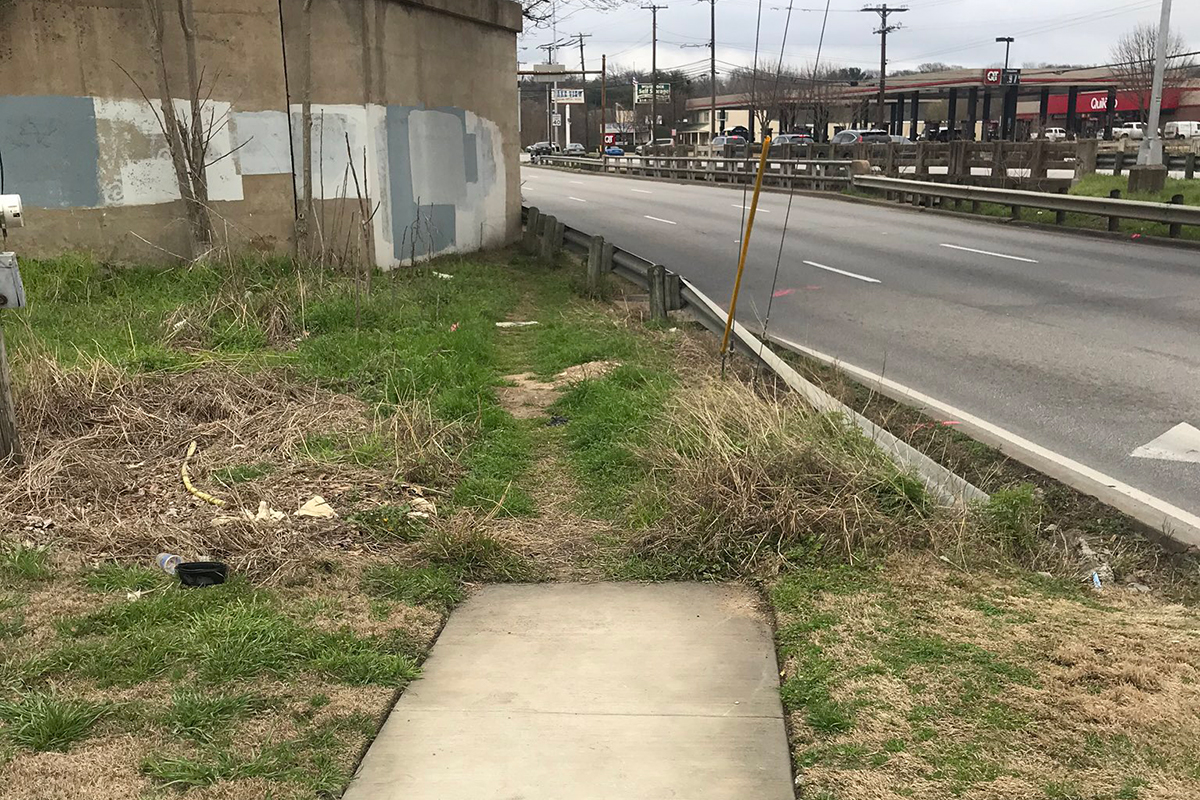When Dallas’ newest City Council members were sworn in Monday, Mayor Eric Johnson gave a speech about getting back to the basics of city governance: things like building permits, trash pickup, public safety, economic development. On Wednesday, City Council member Cara Mendelsohn recalled that commitment as the new council was briefed on a plan to improve Dallas’ old and busted sidewalk system. Fundamentally, the city has an obligation to make sure people can move about safely. A sidewalk is about as basic as it gets.
As most people who have done any serious walking in Dallas can attest, the city doesn’t always get the basics right. We’ve written before about the city’s estimate that Dallas is missing roughly 2,000 miles of sidewalk. If you’re lucky enough to have a sidewalk, odds are good it’s uncomfortably narrow, or pitted and cracked, or for some reason studded with straight-down-the-center decorative light poles that force you to run an obstacle course every time you go for a stroll. Now imagine getting around on that kind of sidewalk if you’re in a wheelchair, or pushing a stroller.
Robert Perez, director of the city’s public works department, told council members that it would take a little under $2 billion to totally fix this: $1 billion to fill in the 2,000 miles of missing sidewalk, and about $976 million to fund 40 years of maintenance on the sidewalk we already have. This year, the city put about $10 million toward sidewalks. Perez says his department will ask for about $8 million a year for sidewalks to come from the city budget, with plans to get another $12 million a year from a bond package that should come up a few years down the road.
That’s $20 million a year for sidewalks. Meaning it would take about 100 years to “fix” Dallas’ sidewalk system. If they’re not riding around in flying electric cars—or hiding out from cannibals in a post-apocalyptic wasteland—your great-grandchildren will be able to follow the sidewalk all over Dallas.
Of course, Dallas doesn’t need to fill in all 2,000 of those missing miles. There are neighborhoods that need sidewalks more than others. There are not many pedestrians in industrial areas, for example. That’s part of why the city developed this new Sidewalk Master Plan: to identify “focus areas” where demand and need are both high.
Dallas also may not have to foot the bill all on its own. Council members asked whether other public entities, namely DART and Dallas ISD, would be able to pay for sidewalk improvements. Other cities have adopted so-called “impact fees” on new development, using those funds to pay for nearby street and sidewalk upgrades. And city officials are keeping an eye on the potential federal infrastructure bill being batted around in Washington D.C.
City officials poured cold water on some of these ideas. DART and Dallas ISD have, historically, been unwilling or unable to pay for any infrastructure improvements on property they don’t own. That’s true even if, in practice, they benefit from infrastructure adjacent to that property. When the City Council talked about potential impact fees on new construction a couple months ago, the pushback from developers—many of them already frustrated and running to the suburbs because of Dallas’ broken permitting system—was fierce and immediate. And it’s unclear at the moment how any federal infrastructure bill, if one makes it through Congress, could help Dallas build the sidewalks it badly needs.
The city also offers a sidewalk replacement program that splits the cost of replacement with landowners. If you, for example, own a home with a busted-up sidewalk, the city will pay half of what it takes to replace it. (This usually runs about $2,000, Perez said.) If you weren’t aware this program existed, or that you as a homeowner are responsible for the sidewalk outside your home, you are not the only one. In developing the sidewalk master plan, the public works department is also pushing for more public awareness of sidewalk maintenance responsibility.
The plan also provides the opportunity for the city to create what the department is calling a “Pedestrian Advisory Committee,” along with a system that would track progress on sidewalk projects. At some point, the sidewalk master plan itself will go online so that we can actually see it. This will provide a closer look at areas of need and specific projects that could benefit individual neighborhoods. All of which is an important part of making Dallas better for pedestrians.
But the city still has to find a way to pay for it, whether it’s through impact fees or federal grants or bond money or simply a larger chunk of the general budget. Mendelsohn suggested she would like to see sidewalk projects be “more fully” funded. “This is exactly what our residents expect of us. This is an essential city service,” she said.
It’s budget season. After the presentation on the sidewalk master plan, City Council members almost immediately got into into a discussion of the city’s budget for the coming year. (City Manager T.C. Broadnax told council members it would “absolutely be the best budget” they will see in their lifetimes.) The city’s spending is a reflection of its priorities. And if the mayor’s speech this week was any guide, Dallas’ elected leaders want to put campaign season behind them and prioritize the basics.
New and returning City Council members were in many cases elected over opponents who ran on divisive national issues that ultimately have very little to do with running a city. If the new City Council wants to put its money where its mouth is, it can start by paying to build some sidewalks.






